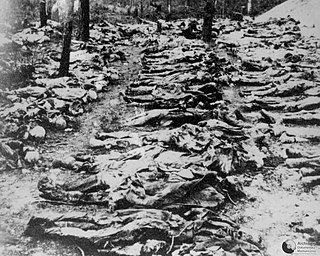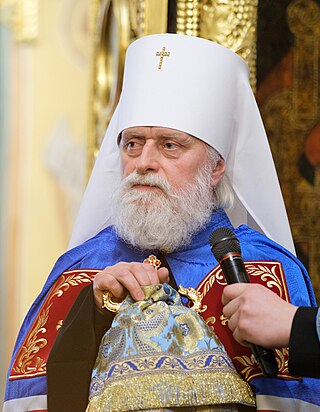Related Research Articles

Ivangorod is a town in Kingiseppsky District of Leningrad Oblast, Russia, located on the east bank of the Narva river which flows along the Estonia–Russia international border, 159 kilometers (99 mi) west of Saint Petersburg, 218 kilometers (135 mi) east of Tallinn, Estonia. The town's population was recorded as 9,854 (2010 Russian census); 11,206 (2002 Census); 11,833 (1989 Soviet census).

Russia has participated in the Eurovision Song Contest 23 times since its debut in 1994. Russia won the 2008 contest with Dima Bilan performing the song "Believe". One of the most successful countries in the contest in the 21st century with a total of ten top five placements, Russia finished second with Alsou in 2000, Dima Bilan in 2006, Buranovskiye Babushki in 2012 and Polina Gagarina in 2015; third with t.A.T.u. in 2003, Serebro in 2007, Sergey Lazarev in 2016 and 2019, and fifth with Dina Garipova in 2013. In 2018, the country failed to qualify for the final for the first time in its history. The Russian entry has been chosen through both internal selections and a televised national final titled Evrovidenie, with its most recent entry (2021) being chosen by the latter.
Soviet deportations from Estonia were a series of mass deportations in 1941 and 1945–1951 carried out by the Stalinist regime of the former USSR from then Soviet-occupied Estonia. The two largest waves of deportations occurred in June 1941 and March 1949 simultaneously in all three occupied Baltic countries: Estonia, Latvia, and Lithuania. The deportations targeted primarily women, children and the elderly, calling them 'anti-Soviet elements'. In addition, there were Soviet deportations from Estonia based on the victims' ethnicity and religion. Ethnic Estonians who had been residing in Soviet Russia had already been subjected to deportation since 1935.

The 76th Guards Chernogov Red Banner Air Assault Division is a division of the Russian Airborne Troops based in Pskov. The division traces its lineage back to the 76th Guards Rifle Division, formed in March 1943 from the 157th Rifle Division for that division's actions during the Battle of Stalingrad. The division fought in the Battle of Kursk, the Battle of the Dnieper, Operation Bagration, the East Pomeranian Offensive, and the Berlin Offensive. Postwar, it was converted into an airborne division.

Svitlana Serhiivna Loboda, also known by the stage name Loboda, is a Ukrainian singer and songwriter.

Evgeny Romanovich Ustyugov is a Russian former biathlete. Born to cross-country skiers, Ustyugov was introduced to biathlon at the age of three. He started his career in junior tournaments in 2005, before going professional three years later in the European Championships. He is an Olympic champion in the men's 15 km mass start event at the 2010 Winter Olympics in Vancouver, British Columbia, Canada. Prior to the 2010 Olympic Games, his best World Championship finish in an individual event was 20th place.

Anti-Katyn is a denialism campaign intended to reduce and obscure the significance of the Katyn massacre of 1940 — where approximately 22,000 Polish officers were murdered by the Soviet NKVD on the orders of Joseph Stalin — by referencing the deaths from disease of thousands of Imperial Russian and Red Army soldiers at Polish internment camps during the Interwar period.

Altogether, 108 civilian protesters and 13 police officers were killed in Ukraine's Revolution of Dignity, which was the culmination of the Euromaidan protest movement. The deaths occurred in January and February 2014; most of them on 20 February, when police snipers fired on anti-government activists in Kyiv. The slain activists are known in Ukraine as the Heavenly Hundred or Heavenly Company. By June 2016, 55 people had been charged in relation to the deaths of protesters, including 29 former members of the Berkut special police force, ten titushky or loyalists of the former government, and ten former government officials.

Yevgeny Vitalyevich Balitsky is a Russian and former Ukrainian politician, entrepreneur and former army officer who is currently serving as the governor of Zaporozhye Oblast, one of the Russian-occupied territories of Ukraine, since 2022.

Yevgeny Viktorovich Prigozhin was a Russian mercenary leader and oligarch. He led the Wagner Group private military company and was a close confidant of Russian president Vladimir Putin until launching a rebellion in June 2023. Prigozhin was sometimes referred to as "Putin's chef" because he owned restaurants and catering businesses that provided services to the Kremlin. Once a convict in the Soviet Union, Prigozhin controlled a network of influential companies whose operations, according to a 2020 investigation, were "tightly integrated with Russia's Defence Ministry and its intelligence arm, the GRU".

The Kerch Polytechnic College massacre was a school shooting and bomb attack that occurred in Kerch, Crimea, on 17 October 2018, when 18-year-old student Vladislav Roslyakov killed 20 people and wounded 70 others before subsequently committing suicide. It was the deadliest school shooting in the former Soviet Union since the 2004 Beslan school siege.

Metropolitan Eugene is a bishop of the Russian Orthodox Church, Metropolitan of Tallinn and All Estonia and primate of the Estonian Orthodox Church of the Moscow Patriarchate, former rector of Moscow Theological Academy (1995–2018) and Chairman of the Educational Committee of the Holy Synod (1994–2018). After on January 18, 2024, Estonia announced that it would not renew Reshetnikov's residence permit Reshetnikov left Estonian on February 6, 2024. His residence permit was evoked because he was assessed to be a security risk due to his justification of Russia’s invasion of Ukraine and his defense of the Russian government.

The Islamic State insurgency in the North Caucasus is ongoing terror activity of the Islamic State branch in the North Caucasus after the insurgency of the Caucasus Emirate.
Yevgeny Valeryevich Krasnoyarov, known as The Ripper of Tajiks, is a Russian serial killer and Neo-Nazi who murdered six people and harmed eight others in Chita, Zabaykalsky Krai, from 2006 to 2016. Most of the killings were committed on ethnic grounds, with him claiming that he wanted to rid the country of foreign drug dealers.
References
- 1 2 3 4 Ракитин, Алексей (2016). "Социализм не порождает преступности": серийная преступность в СССР : историко-криминалистический анализ ["Socialism does not breed crime": serial crime in the USSR: a historical and forensic analysis] (in Russian). Kabinetnyĭ uchenyĭ. ISBN 978-5-7525-3028-9.
- ↑ Filippov, Madis (24 March 2013). "Vaindloo - riigi põhjapoolseim kodu" [Vaindloo - the country's northernmost home]. Postimees (in Estonian). Retrieved 8 March 2020.
- ↑ "Vier schoten" [Four shots]. Friese Koerier (in Dutch). 4 August 1959. Retrieved 8 March 2020– via Delpher.
- ↑ Жирнов, Евгений (22 April 2013). "Дело о бойне в казарме" [The barracks massacre case]. Kommersant (in Russian). Retrieved 8 March 2020.
- ↑ Kiil, Urmas (29 March 2008). "Mälestusi Nõukogude armeega toimunud vahejuhtumitest" [Memories of encounters with the Soviet army]. Saarte Hääl (in Estonian). Retrieved 8 March 2020.
- ↑ Pihlau, Jaak (1 June 2005). "Eesti demokraatlik põrandaalune ja kontaktid Läänega" [Estonia's democratic underground and contacts with the West](PDF). Tuna (in Estonian). ISSN 1406-4030 . Retrieved 8 March 2020.
- ↑ "Оборотни в погонах: как это было в семидесятые" [Werewolves in uniform: how it was in the seventies] (in Russian).
- ↑ "Accused Ukrainian serial killer claims to be creature of the devil". CNN . 4 December 1998. Retrieved 11 April 2024.
- ↑
- Королев, Арсений (3 April 2015). "Солдаты-убийцы" [Murderous soldiers]. Улпресса (in Russian). Retrieved 13 November 2023.
- Семенов, Евгений (2010). "Одиннадцать трупов на двоих" [Eleven corpses for two]. Тюрьма и жизнь за решеткой (in Russian). Archived from the original on 9 November 2011. Retrieved 13 November 2023.
- "Краснодарец, расстрелявший 13 человек в Ульяновске и приговоренный к пожизненному, может выйти на свободу" [Krasnodar man who shot 13 people in Ulyanovsk and was sentenced to life imprisonment may go free]. Ульяновск онлайн (in Russian). 17 March 2017. Retrieved 13 November 2023.
- "Родного Края Памятные Даты" [Commemorative Dates of the Motherland]. Барышские вести (in Russian). No. 2. 15 January 2016. Retrieved 13 November 2023.
- "Расстреляли караул" [They shot a guard]. Ulyanovskaya Pravda (in Russian). Годы и люди. 17 July 1991. Retrieved 13 November 2023.